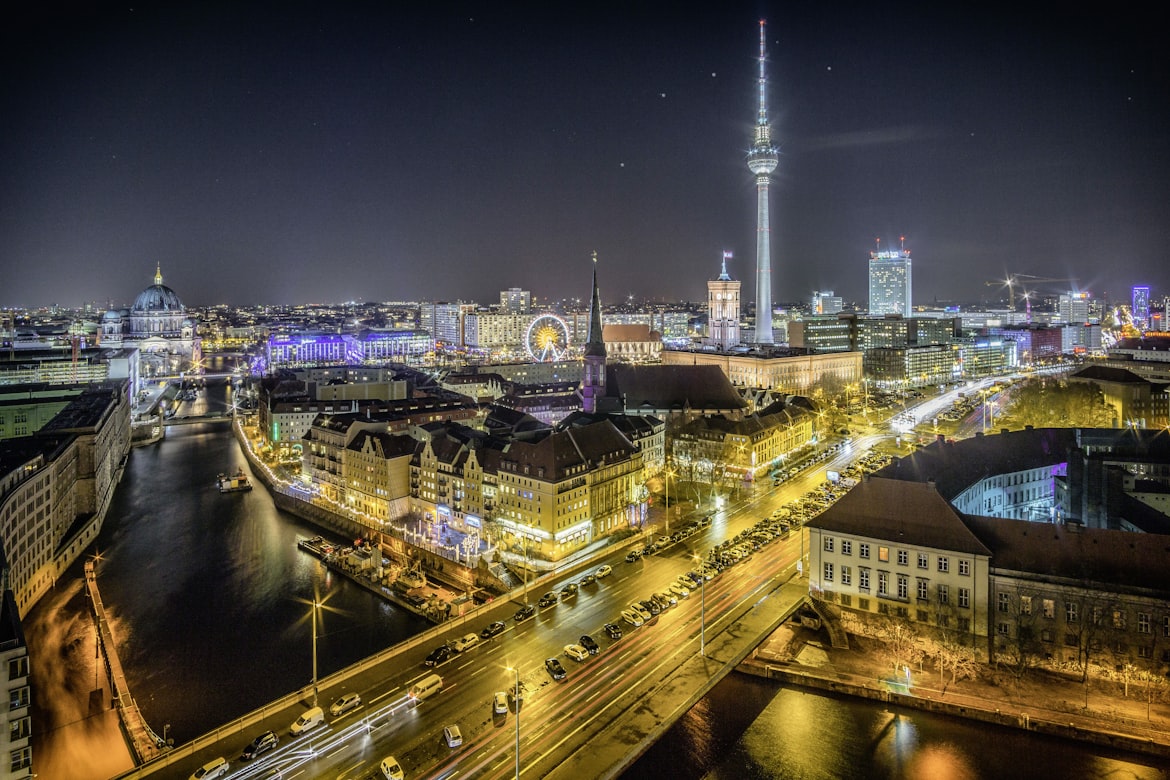Are you planning on visiting Europe in 2024 but you don’t know when is the best and the worst time to visit Germany? In this article, we will try to help you organize your next holidays in one of the most popular destinations in Europe.
Germany boasts diverse attractions year-round, ensuring that visitors can enjoy unique experiences in every season. The most popular tourist destinations in Germany are Berlin, Munich, Frankfurt, and Hamburg.
Berlin is the capital of Germany and is known for its historical sites, nightlife, and culture. Munich is the largest city in Bavaria and is known for its beer halls and festivals. Frankfurt is the financial capital of Germany and has a large international airport, and Hamburg is the largest city in Northern Germany and is known for its ports and canals.
What is The Worst Time to Visit Germany?
Winter is the worst time to visit Germany because many attractions close down or have reduced hours during the colder months. This means that you’ll have less to do and see during your visit.
Additionally, the weather can be quite miserable during this time of year.
Temperatures often hover around freezing, and it’s not uncommon for snow and ice to make travel difficult.
Finally, accommodation prices tend to be at their highest during the winter season.
So, if you’re looking for the best deal on your trip, you’ll likely want to avoid visiting Germany during this time of year.
When is the Best Time to Visit Germany?
The best time to visit Germany depends on the City you want to visit. Every city has its own charm, so depending on your preferences, you can choose the best time for you to visit.
When is The Best Time to Visit Berlin?
While there is no wrong time to visit Berlin, there are certain times of the year that offer the best experience. The spring months of April and May are ideal for exploring the city, as the weather is mild and the days are long.
In addition, many of the city’s famous festivals, such as the Berlin International Film Festival, take place during this time.
However, travelers should be aware that hotel prices tend to be higher during peak season.
Those looking for a more budget-friendly option may want to visit Berlin during the fall or winter when temperatures are cooler but hotels are cheaper.
When is The Best Time to Visit Munich?
Munich is a wonderful city to visit any time of year, but certain times are better than others. For example, the Oktoberfest celebration is world-renowned and takes place annually in September and October. If you’re interested in attending this exuberant festival, it’s best to plan your trip for September or early October.
However, keep in mind that hotels fill up quickly during Oktoberfest, so it’s important to book your accommodations well in advance.
If you’re looking for a quieter time to visit Munich, spring or autumn are both ideal.
The weather is pleasant and there are fewer tourists, so you’ll have a chance to explore the city and its many cultural attractions.
When is The Best Time to Visit Frankfurt?
The best time to visit Frankfurt is in the spring when the weather is mild and the days are lengthening.
This is also a good time to visit Frankfurt if you’re interested in exploring the city’s museums and cultural attractions, as many of them are open during this season.
If you’re more interested in outdoor activities, then you may want to visit Frankfurt in the summer, when the temperatures are warm and there’s plenty to do in the city’s parks and green spaces.
When is The Best Time to Visit Hamburg?
The best time to visit Hamburg may be in the late spring or early summer when the weather is warm but not yet sweltering, and the days are long.
This is also a good time to catch the annual street festivals, which celebrate everything from music to film to art. If you’re looking for a more relaxed pace, autumn may be a better choice.
The colors are changing, and there are cozy fires lit in many of the cafes and restaurants. Winter can be magical as well, with snow-covered streets and festive markets.
The weather in Germany
The weather in Germany can be unpredictable, but some general patterns tend to occur throughout the year.
In the winter, the country experiences cold temperatures and frequent snowfall.
This can make travel difficult, so it’s important to be prepared if you’re planning a trip during this time of year.
The spring and autumn months are generally milder, with occasional showers.
This is an ideal time to visit if you’re looking to avoid the crowds but still enjoy the beautiful scenery that Germany has to offer.
Summer is the busiest time of year for tourism, as the weather is warm and sunny.
However, it’s also worth noting that this is also the rainy season, so you may want to pack an umbrella!
Despite the occasional downpour, though, the summer months are a great time to explore all that Germany has to offer.
Weather in Munich: Munich is a city in southern Germany that experiences mild weather throughout the year.
The average temperature in Munich is 8.5 degrees Celsius, with the average high being 13 degrees Celsius and the average low being 4 degrees Celsius.
Munich experiences an average of precipitation per year, most of which falls in the form of rain.
The city is also susceptible to occasional thunderstorms and hail storms.
Snow is relatively rare in Munich, but the city does experience a few days of snowfall each year.
Overall, Munich enjoys mild weather which makes it a pleasant place to live and visit.
Weather in Berlin: Berlin has a temperate seasonal climate, which means that it experiences four distinct seasons.
The average temperature in summer is around 25 degrees Celsius, while in winter it hovers around 0 degrees.
However, temperatures can sometimes reach as high as 30 degrees in summer and plunge as low as -10 in winter.
Berlin also experiences a fair amount of rainfall, with an annual average of around 650 millimeters.
The city is prone to heavy downpours and thunderstorms, so it’s always a good idea to have an umbrella on hand.
Weather in Frankfurt: Frankfurt experiences a moderate climate, with cool winters and mild summers.
The city is located in the Rhine-Main lowlands, which means that there is little variation in elevation.
As a result, Frankfurt experiences relatively mild weather conditions year-round.
However, the city does see some precipitation, particularly in the form of rain.
Frankfurt is one of the wettest cities in Germany, receiving an average of around 750mm of rain per year.
Despite this, Frankfurt is still a popular tourist destination, thanks to its lively cultural scene and abundance of historical landmarks.
Weather in Hamburg: Hamburg has a temperate, maritime climate, with cool to mild winters and warm summers.
The city experiences a fair amount of rainfall throughout the year, with the wettest months being October, November, and December.
Hamburg is often shrouded in fog during the winter months.
January and February are the coldest months, with temperatures averaging around freezing point.
In contrast, July and August are the warmest months, with highs of around 25 degrees Celsius.
Spring and autumn are generally mild, with temperatures ranging from 10 to 20 degrees Celsius.
Overall, Hamburg enjoys a moderate climate, although conditions can vary considerably from one day to the next.

Why is Winter the Worst Time to Visit Germany?
Winter can be a tricky time for travel in Germany because of the cold temperatures, low amount of sunlight, and potential snowfall.
The colder weather can make visiting certain outdoor attractions difficult or even impossible, which means visitors may have to spend more time indoors than they otherwise would.
Despite these drawbacks, there are still plenty of activities travelers can enjoy during their winter trip; from hot springs and apres ski resorts to visiting Christmas markets around the country!
What is the cheapest time to go to Germany?
The cheapest time to visit Germany is during the shoulder season, which falls between April and May or September and October.
During these months, hotels and other tourist attractions are typically less crowded and prices are lower.
Another way to save money is by booking your travel in advance.
Most airlines offer discounts for tickets that are purchased weeks or even months in advance.
How many days in Germany is enough?
Germany is a large country with plenty to see and do, so it can be difficult to know how much time to spend there.
If you’re only interested in the major cities, then three or four days may be sufficient.
However, if you want to explore more of what the country has to offer, then a week or longer is recommended.
For example, the Bavarian region is renowned for its fairytale castles, while the Black Forest offers up picturesque villages and towering mountain peaks.
And of course, no visit to Germany would be complete without spending some time in Berlin, the lively capital city.
So whether you’re looking for culture, history, or just good old-fashioned fun, Germany has something to offer everyone. Just be sure to give yourself enough time to enjoy it all.




